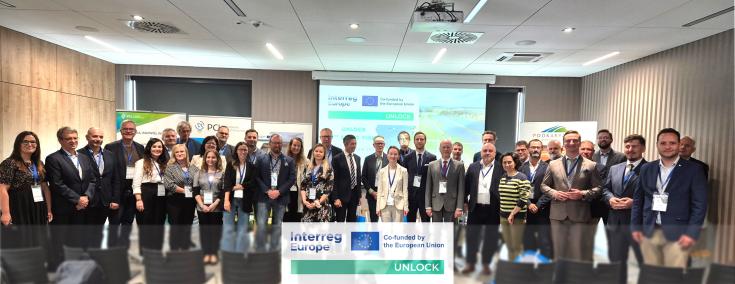Fueling the Future: How EU SMEs can thrive with Green H2
An update from Rzeszów, Poland! On June 4th-5th, the city hosted the third study visit of the UNLOCK project. This inspiring event was a great success full of exchanging information, showcasing groundbreaking best practices, celebrating remarkable progress, and sparking discussions on regional policy improvements—all focused on propelling the green hydrogen (H2) economy forward in the Podkarpackie region.
Empowering SMEs in Green Hydrogen: Regional Strategies and Practical Integration
On the first day participants were engaged in different seminar sessions on regional policies to enhance sustainable growth, SME competitiveness, and job creation within SMEs in developing green H2 regions.
The discussions highlighted the importance of the role of regional policy instruments in the development of the green H2 economy in regions like Podkarpackie. Experts emphasized the need for regional authorities to raise awareness about the potential of a green H2 economy and facilitate the participation of SMEs in these initiatives.
The second seminar session focused on implementing a H2 ecosystem into cities – what are the challenges and possibilities for SMEs, they were discussing the practical aspects of integrating hydrogen technologies into city infrastructure, including transportation, energy supply, and industrial applications. They provided recommendations for policymakers on the improvement of SMART regional policies to support the widespread adoption of H2 technologies.
In the afternoon, participants visited the CEREL Institute of Power Engineering. CEREL is carrying out advanced research work in the field of solid oxide fuel cells (SOFC) and oxygen membrane technologies. The production of solid oxide fuel cells was shown. All project partners and participants visited the Hydrogen Laboratory of the Rzeszow University of Technology and had a workshop on solid oxide fuel cells and transforming aviation into a zero-carbon sector. They showed the first hydrogen-powered motor glider in Poland.
On the second day, partners and stakeholders of the UNLOCK project shared their progress, learned lessons, and had a Steering committee meeting. Representatives from various regions provided updates on their efforts to develop green hydrogen economies and improve regional policies. The discussions highlighted the importance of knowledge sharing and collaboration among UNLOCK stakeholders and partners to drive the success of the project. The symposium concluded with a focus on the next steps, including the preparation for the 4th Interregional Event in the Puglia Region, Italy.
The 3rd Interregional event of the UNLOCK project provided valuable insights into the development of a green hydrogen economy for SMEs in European regions. The event highlighted the critical role of regional policies, the potential for SME development, and the importance of collaboration among stakeholders and partners. The UNLOCK project is closer to achieving its objectives: improving regional policy instruments to enhance sustainable growth, SMEs competitiveness, and job creation within SMEs in the rapidly developing green H2 economies.
